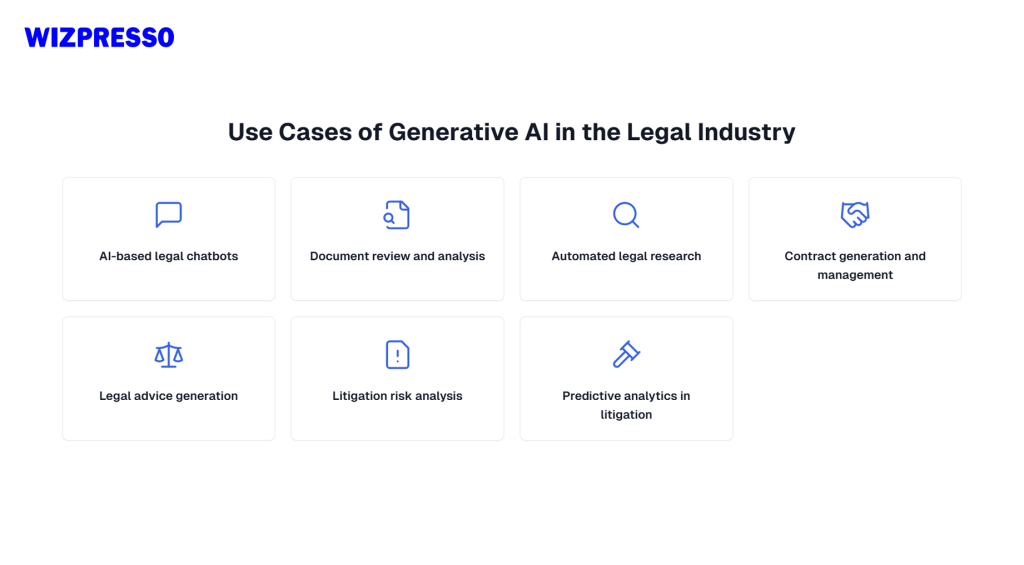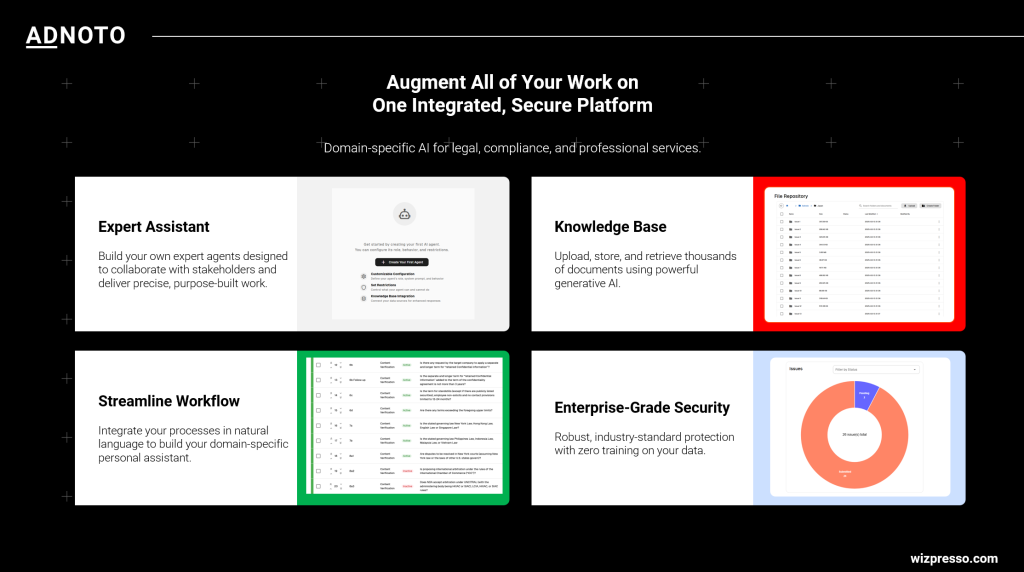
Pain Points and AI Solutions
Solicitors in commercial law, corporate law, and capital markets often face challenges like managing large document volumes, keeping up with changing regulations, and meeting client expectations for efficiency. Agentic AI can autonomously prioritize tasks, helping manage workloads effectively. Generative AI can draft initial versions of contracts or legal documents, saving time, while Retrieval Augmented Generation (RAG) enhances research by retrieving relevant case law or regulatory updates, ensuring compliance.
For example, in capital markets, AI can predict market trends and automate regulatory filings, reducing errors. In corporate law, it aids due diligence by reviewing merger documents, and in commercial law, it supports contract negotiations by analyzing clauses. These technologies seem to offer significant value, but their success depends on addressing implementation hurdles.
In today’s fast-paced legal environment, efficiency is paramount. Legal professionals are increasingly turning to innovative technologies like generative AI and retrieval augmented generation (RAG) to streamline workflows and enhance productivity. These technologies offer numerous applications that can significantly improve legal operations, from analyzing Non-Disclosure Agreements (NDAs) to automating document due diligence workflows.

Examples of Generative AI in Legal Workflows
1. NDA Analysis
One of the critical applications of generative AI in legal workflows is the analysis of NDAs. Lawyers often face the daunting task of sifting through lengthy contracts to identify potential red flags, such as standstill agreements and indemnity clauses. Generative AI can quickly scan and analyze these documents, highlighting areas of concern and providing insights into potential risks. This not only speeds up the review process but also enhances the accuracy of assessments.
2. Standard Agreement or T&C Gap Analysis
Lawyers regularly need to ensure that clauses in standard agreements or terms and conditions (T&Cs) align with their firm’s established practices. Generative AI can facilitate gap analysis by reviewing contracts against a firm’s standard templates and identifying discrepancies. Furthermore, it can suggest how clauses may be negotiated, empowering lawyers with strategic insights that can save time and improve negotiation outcomes.
3. Workflow Automation
Automating document due diligence workflows and checklists is another area where generative AI shines. By integrating AI into document management systems, firms can create automated workflows that ensure compliance with legal standards. This not only reduces manual effort but also minimizes the risk of human error, leading to a more robust compliance framework.
4. Enhanced Knowledge Base
Generative AI can also serve as a personal assistant that incorporates a lawyer’s domain knowledge, historical work, and other training data. By enhancing information retrieval capabilities, AI can provide tailored insights and recommendations that reflect the expert level of a seasoned lawyer, ultimately supporting decision-making processes.
Benefits and Challenges
The benefits include increased efficiency, reduced errors, and scalable operations, allowing solicitors to focus on strategic work. However, challenges like ensuring data quality, protecting client confidentiality, and integrating AI into existing systems are notable. Ethical concerns, such as AI replacing human judgment, and high implementation costs, particularly for smaller firms, add complexity. Training lawyers to use these tools effectively is also crucial, and ongoing support is needed to maintain benefits.
Artificial Intelligence (AI) is increasingly recognized as a transformative force in the legal industry, providing several key advantages:
- Optimizing Routine Operations: AI can automate repetitive tasks such as contract drafting and document review, potentially streamlining up to 44% of current legal tasks. This reduction in manual work allows attorneys to focus on more strategic activities.
- Heightened Efficiency: By leveraging AI, legal professionals can complete a greater number of operations in less time. This is particularly crucial, as time is one of the most valuable assets for lawyers.
- Enhanced Access to Resources: AI systems can quickly locate and assess relevant legal references, improving decision-making and alleviating the pressure on legal professionals.
- Improved Client Services: The efficiency and accuracy provided by AI lead to faster response times, enhancing client satisfaction and retention rates.
- Productivity Gains Across Organizations: A significant majority of law firms (85%) and legal departments (84%) anticipate that increased technology usage will lead to improved productivity, making AI an integral tool for modern legal practices.
By addressing routine tasks, enhancing efficiency, and improving client interactions, AI stands to significantly elevate the quality of legal services. While the benefits of generative AI and RAG are clear, there are significant challenges that lawyers face when adopting these technologies.
Hallucinations
One of the primary concerns is the issue of “hallucinations,” where AI systems generate information that is inaccurate or misleading. This can pose serious risks in legal contexts, where precision is critical.
Lack of Domain-Specific Knowledge
Another challenge is the AI’s lack of domain-specific knowledge. Generic models often fall short in understanding the intricacies of legal language and concepts, which can lead to misinterpretations.
Addressing Challenges with Enterprise Platforms
To effectively mitigate these challenges, organizations can leverage enterprise platforms that specialize in legal AI solutions. Such platforms can be designed to incorporate robust training mechanisms, ensuring that the AI is well-versed in the specific legal domain. They can also include features for verifying the generated content, thereby reducing the risk of hallucinations and enhancing overall reliability.
Enterprise AI can address said challenges and augment legal professionals
Wizpresso’s Adnoto platform stands out as a powerful tool that helps lawyers leverage generative AI and RAG to improve their workflows. With its knowledge management and agentic AI capabilities, Adnoto offers a sophisticated framework for integrating domain knowledge into the AI model. This includes:
- Expert Assistant: Build your own expert agents designed to collaborate with stakeholders and deliver precise, purpose-built work.
- Document Analysis: The platform excels in analyzing complex legal, regulatory, and disclosure documents, providing insights into potential risks and gaps.
- Workflow Automation: Integrate your processes in natural language to build your domain-specific personal assistant.
- Knowledge Base:Upload, store, and retrieve thousands of documents using powerful generative AI.

Wizpresso’s platform is secured by design, offering enterprise-grade security to ensure your knowledge is safe and not used for any unauthorized AI training.
Generative AI and RAG are transforming the legal landscape, offering innovative solutions that enhance workflow efficiency and accuracy. By addressing the inherent challenges and leveraging specialized platforms like Wizpresso’s Adnoto, legal professionals can not only keep pace with the demands of their clients but also elevate the quality of their legal services. As technology continues to evolve, the future of legal work is poised to become even more efficient and insightful.
To learn more about building legal AI agents with Adnoto, read our use case article: https://wizpresso.com/Posts/build-your-legal-ai-agent-to-automate-due-diligence
To learn more about Adnoto, visit: https://wizpresso.com/KnowledgeManagement/Adnoto
